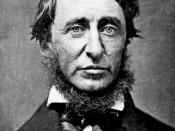The way one should govern and the way for one to be governed will always be an ongoing struggle. How can a government maintain order and the safety of its people yet at the same time preserve its citizens' natural right to be free? The ideas from Niccolo Machiavelli, an Italian aristocrat, who published "The Prince" in 1513 for a Medici prince as a guideline on how to rule a country, gives a conservative approach to how one should govern. Henry David Thoreau's "Civil Disobedience" published in 1849, offers a liberal approach on how one should be governed. Machiavelli stresses the importance of maintaining order while Thoreau suggests reform.
Although their views are different both men approach their positions in an aggressive manner. Machiavelli's approach for his audience would be through fear and power while Thoreau's approach for his audience would be through nonviolent acts, such as being a nuisance to the government.
Machiavelli's audience would be any person in a position of power, particularly that of a prince. Machiavelli uses aphorisms and historical references when introducing his argument. Not only would he present his argument but he also presents an opposing point of view and discredits it. Thoreau's audience would be people who share his views on a less controlling and a moral government. Thoreau appeals to his audience through the use of aphorisms as well as analogies with which people would be able to identify.
Machiavelli insists that a ruler must do whatever is in his power to rule his people regardless of whether his actions are moral or immoral and that "...it is safer to be feared than to be loved when one of the two must be lacking....For one can generally say this about men: that they are ungrateful, fickle, simulators and deceivers, avoiders...



Machiavelli vs. Thoreau
This is a good compare and contrast essay which would have been even better with a bibliography.
6 out of 6 people found this comment useful.